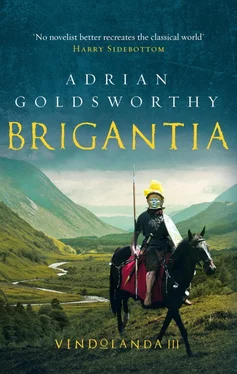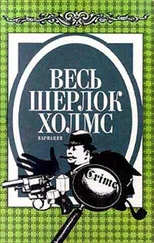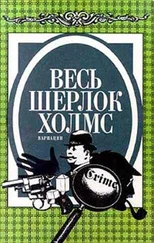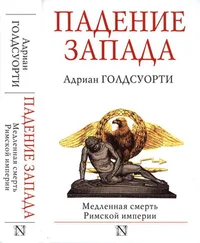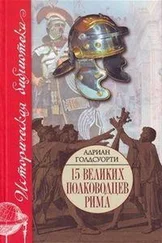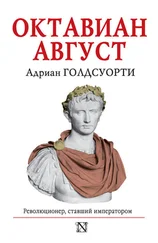LIKE ITS PREDECESSORS, Brigantia is a novel set at a time when very little indeed is known about events in the Roman province of Britannia. While I have tried to depict the Roman army and government, and also Roman and tribal societies, as plausibly as possible, the key events of the story had inevitably to be invented.
Some of the people were real. Lucius Neratius Marcellus was the provincial legate at this time and was probably accompanied to Britain by his friend Quintus Ovidius, but we do not know much about either of them. Similarly, Cerialis, Lepidina, Brocchus and Severa appear solely in the Vindolanda writing tablets, which give no more than glimpses of their lives. Thus their characters in the story are invented, although I have done my best not to contradict anything we do know about them.
Much of the rest of the cast, from Ferox and Vindex through to Acco and the Brigantian royal siblings, are pure fiction. The name Arviragus occurs in Juvenal’s Satires , where he seems to have been a British king who fought against the Romans during Domitian’s reign. He is otherwise unknown and I have simply taken the name. There is no evidence for a succession dispute among the Brigantes at this time or indeed for any rebellion in Britannia. In fact, there is no certain evidence for any revolt in lowland Britain after Boudicca in ad 61. Recently, one scholar has re-interpreted the hundreds of skulls found in the Thames at Walbrook as signs of Roman reprisals after a rebellion in the area during Hadrian’s reign. It is an intriguing possibility, and I was sorely tempted to twist his chronology and use this material for our story, but did not feel justified in doing this. Perhaps one day Ferox will get caught up in that business, whatever it proves to be.
The Brigantes were the largest tribal group in Britain described by the Romans, who sometimes used the name as synonymous with Britons. The true relationship between the Brigantes and neighbours like the Carvetii and Textoverdi is unclear, as is the extent to which any of these groups were politically united. In some cases the Romans imposed clearer structures on indigenous peoples, most probably for administrative convenience. We know, for instance, that the boundaries of the three Galatian tribes, Gauls who had migrated to Asia Minor in the third century bc and settled there, were altered by the Romans. Written evidence for Britain comes solely from Roman sources and post-dates conquest, often by a very long time, so apart from the strong chance of cultural misunderstanding it is always possible that tribal structures had changed by the time they were described.
In ad 43 some or all of the Brigantes were ruled by Queen Cartimandua, who allied with Rome from the start and remained steadfastly loyal to this alliance. We know nothing about her age or ancestry. Mandubracius was a king of the Trinovantes and was supported by Julius Caesar, and the similarity in name has led to the speculation that he was an ancestor of the queen. We know of at least one Gallo-Roman aristocrat who claimed descent from Caesar on the basis of an alleged affair with one of his ancestors, so there seemed no reason not to have Arviragus believe the same thing.
At some point Cartimandua fell out with her husband Venutius, taking his armour bearer as her new consort. This led to war between them and Roman intervention to rescue her on one or possibly two occasions. The passages describing this are confused and no one is sure whether the historian Tacitus describes two separate incidents or gives slightly different versions of the same event. The huge walled enclosure at Stanwick may well have been the main centre of Cartimandua’s power, although as usual nothing is certain. We do not know when and where she died, just as we do not know the age of Caratacus in ad 43 or how long he lived on as an exile. An early phase of the villa at Holme House, near to Stanwick and also not far from the Roman fort at Piercebridge, had both a rectangular stone structure with a veranda on each side and a very substantial round house beside it. The date would just about fit for our story, and I liked the idea of an elderly Cartimandua returning ‘home’ in her last years and living in a way that allowed her to be both Roman and Brigantian.
The goddess Brigantia appears on inscriptions from the second century ad onwards. Her origins are unclear. She may have been promoted or even created under Roman rule as a unifying central cult for the tribe. For this reason she barely appears in the story, but the name has a good ring to it hence its use for the title of the book. Ruling dynasties survived in many communities for generations after the imposition of Roman rule. In most cases the families had become Roman, were often equestrians and might have careers in imperial service. We do not know what happened with the Brigantes, but it is quite possible that pre-existing tribal structures of kings and other aristocrats adapted to the new circumstances and continued within the empire. The Roman inclination was to let provincial peoples run their own affairs as far as possible, not least because the empire lacked the resources and enthusiasm for direct rule. The monument to her is an invention, while the presentation of her as a mystical figure owes a lot to the early Medieval Irish literature, especially Medb of Connaught in the Ulster Cycle.
The latter sources, combined with snippets from Greek and Roman authors describing the Gauls as well as the Britons, and material from other societies in other eras has fleshed out the depiction of the tribes in the story. It is reasonable to suppose that there were many differences between the tribal communities, in language, dress, customs and social and political structure. Therefore I created the tribal gathering of the Brigantes, and their ‘proverbial’ loyalty to friends. The duty of a host to shelter and protect guests under his roof appears in sources for the Celts and in many societies throughout history, so is reasonable to assume the some for the tribes of Britannia.
The druids are poorly recorded in our sources. Caesar tells us that they refused to commit anything to the written word, while they were one of very few cults actively suppressed by the Romans. In ad 60 Suetonius Paulinus crossed the Menai Straits to destroy the cult centres on Mona (modern-day Anglesey). He did not stay long, for news soon arrived of Boudicca’s rebellion, and the island is relatively large, which makes it unlikely that every shrine was destroyed. However, it does appear to have ended the religion as a formally organised cult, which in the past may well have arbitrated in disputes between the tribes. The Romans cannot have wanted a supra-tribal structure independent of their authority and this, combined with distaste at such rituals as human sacrifice, provoked Rome’s hostility. Druids who appear in later years seem little more than wandering medicine men – or occasionally women – making it clear that what survived of the cult bore little relation to its pre-Roman importance. Yet the beliefs did not die out instantly. We hear of a Gallic aristocrat who was a Roman and an equestrian being executed for possessing a druid’s egg, presumably some form of magic talisman. Acco and Prasto are inventions, as are their stories, and Longinus’ description of the landing on Mona substantially embellishes the account in Tacitus.
Scholars continue to debate the impact of Roman conquest on the communities in Britain – and indeed throughout the empire – and the reality was no doubt complicated and subject to constant change. It is easy to fall into the trap of sympathising more readily with one group rather than the other. In the story I have tried to present a mixed picture, with virtue and vice on display in every community and group, and with the towns and cities significantly more ‘Roman’ than some parts of the countryside. No one could have ignored the presence of Rome, since this meant taxation and regulation different from anything that had happened before. Even if someone in the countryside rarely saw a representative of the empire, the shadow of Roman rule was always there. Leaders inevitably came into far more contact with Roman authority and the culture of the empire. Tacitus tells us that his father-in-law, Agricola, encouraged the tribal aristocracy to have their children educated in the Roman fashion and to build monuments and houses in Roman style. No doubt other governors were just as enthusiastic.
Читать дальше
